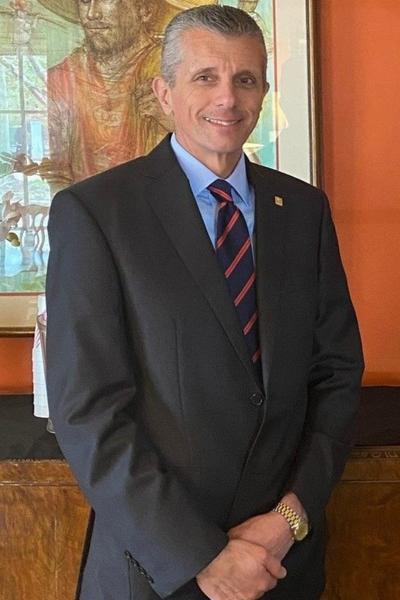
Gone are the days when the primary purpose of a corporation was to maximize profits, said David Cordani, Chairman and CEO of The Cigna Group, during a discussion last week at the Memphis Economic Club in Tennessee.
In today’s business landscape, he said, “I believe deeply that it is not only possible, it is important for a company to be mission-based, have a soul, and be guided by its purpose, while simultaneously being growth-oriented and in pursuit of profit.”
 The Cigna Group is keenly focused on profitable growth and purpose, and is committed to serving shareholders and society as a whole, Cordani said. The onset of the COVID-19 pandemic in March 2020 offers an illustrative example. Cigna Healthcare, the company’s health benefits platform, was the first commercial health care company to step up and agree to cover 100% of COVID-related treatment and testing, removing the cost burden and worry for clients and customers, all for the greater good.
The Cigna Group is keenly focused on profitable growth and purpose, and is committed to serving shareholders and society as a whole, Cordani said. The onset of the COVID-19 pandemic in March 2020 offers an illustrative example. Cigna Healthcare, the company’s health benefits platform, was the first commercial health care company to step up and agree to cover 100% of COVID-related treatment and testing, removing the cost burden and worry for clients and customers, all for the greater good.
“When we made that decision, there was no financial modeling attached to it. We didn’t know if it was $100 million or half a billion dollars. Our board of directors didn’t ask that question,” he said, adding that the company took action simply because it was the right thing to do and was aligned to its mission of improving the health and vitality of those it serves. And the company kept its promise in covering COVID costs, while simultaneously growing its business and profits.
Cordani outlined The Cigna Group’s formula for operating responsibly, which is based on a three-part, purpose-built engagement framework:
- Navigating social issues aligned with purpose
- Taking action in local communities
- Engaging and investing in employees
Navigating social issues aligned with purpose
No company can – or should try – to address every social issue. Unfortunately, those issues are far too numerous. The key, Cordani said, is rallying behind social issues that are meaningful to the organization. “You need to be guided by your mission,” he said. Next, it is important to choose the issues where your organization can make the most impact. The Cigna Group measures the criticality and impact of social issues to its key stakeholders.
One issue the organization has actively championed for decades is diversity, equity, and inclusion (DEI). Like many other companies, following the murder of George Floyd, The Cigna Group leaders re-examined whether the company was living up to the expectations for DEI. “We set out to activate more intensely,” Cordani said.
In 2020, the company launched its Building Equity and Equality Program, a five-year initiative to expand and accelerate our efforts to support diversity, inclusion, equality, and equity for the Black and African American community. Part of the commitment was to reach $1 billion in annual spend with diverse suppliers by 2025, and The Cigna Group is on track to meet that target.
“That is an example of how we are taking action and orienting around social issues, guided by our mission,” Cordani said.
Taking action in local communities
The second part of The Cigna Group’s social issues engagement strategy is turning advocacy into action at the local level, because, as Cordani puts it: “All health care is personal and all health care is local.” The company prioritizes private and public partnerships to impact local communities. One example of this local engagement is the work The Cigna Group is doing with Methodist Le Bonheur Healthcare in Memphis.
Diabetes has been on the rise since 2011, Cordani said, with a 15% increase in the number of people with diabetes nationwide. In Tennessee, that rate of increase is an alarming 25%. The Cigna Group worked closely with Methodist Le Bonheur Healthcare to reverse that trend, particularly among the African American/Black, Hispanic, and South Asian populations – where there was lower clinical engagement, higher numbers of ER visits, and less trust in health systems.
The efforts relied on local community health workers who are best equipped to address cultural barriers, to provide personalized education and help customers manage their diabetes with better access to healthy food and to glucose strips so they can test regularly.
The program achieved remarkable results: 92% of participants lost weight, 83% decreased their cholesterol, and 100% of those with depression saw positive improvements.
Engaging and investing in employees
To win the marketplace, organizations must first win the workplace. Employees are a business’s biggest brand advocates, Cordani said, and are highly invested in the future of the company they work for. At the same time, the last few years have been challenging, and the U.S. workforce is feeling that burden.
During the COVID-19 pandemic, The Cigna Group conducted a large national online survey of U.S. adults to explore the impact of the pandemic on people’s emotional well-being and found that loneliness was at epidemic levels. Since then, the mental health crisis has only grown. More recent research on the state of vitality in the U.S. – the ability to live life with health, strength and energy – found that most Americans are not living with high vitality, which jeopardizes their ability to engage and contribute, impacting families, communities, work, and more.
“We believe the role of an organization is to invest and engage with its coworkers,” Cordani said. “At the end of the day, no organization – public or private – can thrive or exist without healthy, productive, and highly engaged coworkers.”
The Cigna Group invests approximately 18% of total payroll in health, well-being, and other benefits for its workforce. In addition to traditional medical and pharmacy benefits, the company provides physical and mental health support to employees, along with nutrition and fitness programs, employee assistance program benefits, and a caregiver program to support employees who need to care for a close relative, including a grandparent or grandchild.
These investments have resulted in strong engagement scores in the company, particularly around employee health and well-being. Building this culture of health and vitality with its employees has been critical to The Cigna Group’s ongoing success.
Why this matters
A shift coming to the U.S. workforce emphasizes how critical it is for companies to find clarity about their purpose. Generation Z – the cohort of people born between 1997 and 2012 – currently make up about 13% of the U.S. workforce. They will represent almost one third of workers by 2030. Gen Z is the most racially and ethnically diverse of any generation. They are the most purpose-driven, and they are coming of age to join a workforce that has been profoundly impacted by the pandemic, social strife, and systemic inequities. They hold their employers accountable for social responsibility.
The Cigna Group research also shows that this generation is the loneliest, the least resilient and is experiencing the lowest levels of vitality – a key reason the company is partnering with the YMCA to fund a class focused on building leadership skills for Memphis-area teenagers through 2026.
Our organization will continue to embrace corporate responsibility as a leader and a steward of a well-functioning ecosystem of health, and we will stay committed to environmental, social and governance (ESG) efforts that align with what’s most important to us as a company and where we can achieve the greatest impact.
To learn more about our recent vitality research and our partnership with the YMCA click here.